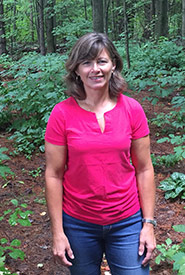Why you should send your kids to nature's summer school
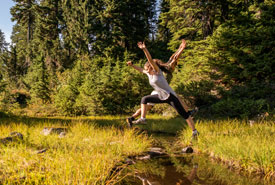
People spending time in nature (Photo by Joe McFarlane/iStock)
Ahh, summer. A break from backpacks and lunches, homework and bedtime fights. But under the relief, there is a niggling thought about how Jack/Jane will spend their summer, and about how ready they will be for school in September.
How about sending them outside to nature nearby? It offers some of the best learning opportunities; it is accessible to all Canadians and it is free. Need more reasons?
Get a good start
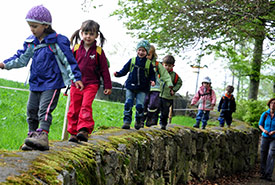
Children exploring the outdoors (Photo by Nature Office for the International Day of Forest Kindergarten)
School entry is a very important milestone in a child's life. In fact, school readiness, measured by competency in motor skills, social and emotional maturity and communication, sets the foundation for success in school. Time playing in nature can help kids learn how to follow rules, ask questions, wait their turn and get along with peers. They run, hop, climb and throw. They draw in the dirt and decorate mud pies. Play in nature develops strength and balance, fine motor and communication skills and builds self-confidence. Give your youngsters a good start.
All children benefit from unstructured play in natural environments. As part of healthy development, elementary and middle school children naturally express creativity, take risks to test themselves and learn their own limits. They also learn problem solving and resilience. This helps them develop autonomy and a sense of self. As noted in the 2015 report titled “The Biggest Risk is Keeping Kids Indoors,” outdoor play at all ages is associated with improved social skills, motor skill development and lower levels of overweight and obesity.
Healthy habits for life
A summer spent outdoors in the back yard or the local park can create some of those special memories that many of us treasure. At the same time, it is helping our children be more active, sleep better, have closer connections to peers and be better able to handle their own emotions. Outdoor play is associated with improved immune function and reduced risk of asthma and nearsightedness.
Give your child tools to their tool box toward good mental health. Time in natural environments has been shown to reduce anxiety and stress, increase self confidence and improve mood. Nature fosters a sense of belonging, which is a strong protective factor for good health.
Academic achievement
Research shows that exposure to greenspace helps cognitive function in children. In research published earlier this year, Dadvand et al. used MRI imaging to show a positive association between long-term exposure to greenspace and brain structure. They found increased volumes in white and grey matter in parts of the brain that are responsible for cognitive functioning. Further testing showed better working memory and reduced inattentiveness in children who lived near nature. This confirms previous studies that show that nature exposure can produce a significant decrease in symptoms of attention deficit hyperactivity disorder.
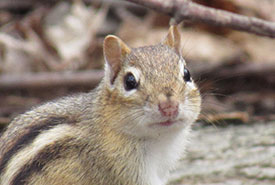
Chipmunk (Photo by Sherry Nigro)
The school of nature can also set up a lifelong interest in the natural sciences. Who knows? Maybe this summer could be the time your child decides to become a conservationist, a veterinarian or a biologist.
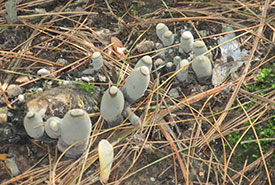
Dead man's fingers, a fungus that can be found in forests and woodland areas. (Photo by Sherry Nigro)
There are all sorts of learning opportunities outside: the life cycle of butterflies, the food chain and the effects of the seasons. There is something for everyone. There are flowers, bird songs and dewy spiderwebs for the artist. If icky things make your child laugh, check out dog vomit mold, a fungus called dead man’s fingers and what animal scat looks like. Mostly, leave it up to your child. Like a meandering stream, let them chose their journey with its twists and surprises. This is their opportunity to be curious about the world we live in, be creative in play and maybe it will fire up lifelong passions.
Not sure how to start?
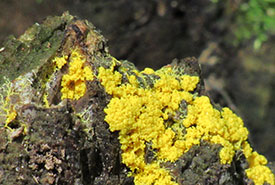
Dog vomit slime mold can be found in moist, shady areas such as rotting logs or leaf litter. (Photo by Sherry Nigro)
Send your child outside to take a photo. Submit it to a nature photography contest. Download apps or e-books that help identify the species in the picture. Ask your neighbour or Facebook friends to recommend what nature hot spots can be found in your local community. Put a bird feeder in the back yard. Join a nature club. Plant brightly coloured flowers in a container. Listen to your child’s stories, ask questions about what they saw, smelled, touched and heard. Let them play in the rain. Tolerate grass stains and muddy shoes. Pack the occasional picnic, and maybe spend some time under the stars.
Time in nature’s summer school can help your child’s development, establish healthy habits and foster academic success.
And did I mention, nearby nature is free? Oh, yeah, it is fun too. Have a good summer!

